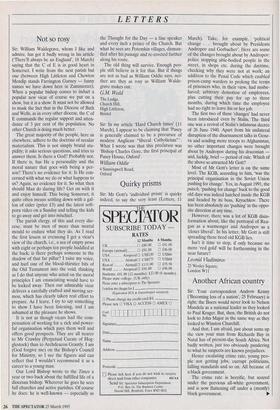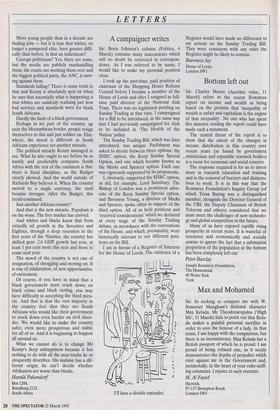Another African country
Sir: Your correspondent Andrew Kenny (Becoming less of a nation', 25 February) is right; the Boers would never look to Nelson Mandela as a national leader as they looked to Paul Kruger. But, then, the British do not look to John Major in the same way as they looked to Winston Churchill.
And that, I am afraid, just about sums up the view your man from Richards Bay in Natal has of present-day South Africa. Not badly written, just too obviously pandering to what he suspects are known prejudices.
Hence escalating crime rate, young peo- ple not getting jobs, currupt politicians, falling standards and so on. All because of a black government.
The crime rate is horrific, but soared under the previous all-white government, and is now flattening off under a (mostly) black government. ► More young people than in a decade are finding jobs — but it is true that whites, no longer a pampered elite, have greater diffi- culty than before. Is that an indictment?
Corrupt politicians? Yes, there are some, but the media are publicly manhandling them, the courts are working them over and the biggest political party, the ANC, is mov- ing against them.
Standards falling? There is some truth in that and Kenny is absolutely spot on when he says that essentially what is happening is that whites are suddenly realising just how bad services and standards were for black South Africans.
Hardly the fault of a black government.
Perhaps in his part of the country, up near the Mozambican border, people resign themselves to this and just soldier on. Else- where, the mood is different as South Africans experience yet another miracle.
The political miracle Kenny managed to see. What he also ought to see before he so hastily and predictably compares South Africa with the rest of the continent is this: there is fiscal discipline, as the Budget clearly showed. And the world outside of Richards Bay believes it. When the country moved to a single currency, the rand became stronger. After the Budget, this trend continued.
Just another African country?
And that is the new miracle. Populism is on the wane. The free market has arrived.
And whites and blacks know that from virtually nil growth in the Seventies and Eighties, through a deep recession in the first years of the Nineties, the country has shifted gear: 2.6 GDP growth last year, at least 1 per cent more this year and more to come next year.
The mood of the country is not one of resignation, of shrugging and moving on. It is one of exhilaration, of new opportunities, of excitement.
Of course, if you have in mind that a black government must crack down on black crime and black rioting, you may have difficulty in accepting the third mira- cle. And that is that the vast majority in the country feel that they are South Africans who would like their government to crack down even harder on civil disor- der. We would like to make the country safer, even more prosperous and stable for all of us. And it is beginning to happen all around us.
What we cannot do is to change Mr Kenny's deep unhappiness because it has nothing to do with all the near-truths he so eloquently describes. His malaise has a dif- ferent origin; he can't decide whether Afrikaners are worse than blacks.
Harald Pakendorf
Box 1200, Randburg 2125, South Africa



























































 Previous page
Previous page